Feature by Lorraine Berry
Which Fiction Titles Would You Nominate?
I’ve always thought the judges for the National Book Awards were more discerning literary critics than I. But this year, when the nominations were announced in early October, I had read four of the five fiction nominees.
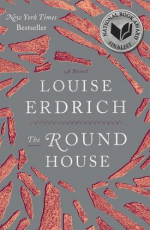 I felt so erudite! So in the know! It was similar to the giddy sensation I get when I realize I’ve actually seen most of the films nominated for an Oscar.
I felt so erudite! So in the know! It was similar to the giddy sensation I get when I realize I’ve actually seen most of the films nominated for an Oscar.
So, I eagerly awaited the announcement of the 2012 NBA winners on Wednesday night, only to end up with mixed feelings: let down as well as elated.
First, the happy part: The nonfiction prize went to Katherine Boo, whose Behind the Beautiful Forevers is an amazing feat of narrative journalism. Months ago, I’d picked it as one of the books of the year.
But the fiction winner? Well, as has happened with the Oscars, when I’ve thought surely the Academy will choose the same winner I would—and then didn’t—the NBA judges picked the one book I hadn’t read: Louise Erdrich’s The Round House. So much for giddiness. I congratulate all the winners, but once again, I’m left wondering if what I love about fiction is not the thing that refined literary critics laud.
In fact, I adore three of the fiction nominees (This Is How You Lose Her by Junot Diaz, The Yellow Birds by Kevin Powers, and Billy Lynn’s Long Halftime Walk by Ben Fountain). Still, there are other 2012 books that could have replaced at least two on that list. For instance, A Hologram for the King by Dave Eggers is the weakest of the four I read. I’ve also never been fond of Erdrich’s work, so I wouldn’t have nominated The Round House.
I’m not the only one, of course, to question the NBA’s fiction picks. In an October 2012 piece in Salon, “National Book Awards: Genre Fiction Dissed again,” Laura Miller argues that Gillian Flynn’s breakout bestseller Gone Girl was left off the list because mysteries and thrillers get short shrift. As Miller points out:
[T]he most prestigious of the awards remain the private reserve of literary fiction. Yet we live and read at a time when the lines between genre and literary fiction are being persistently rubbed away.
I recommended Gone Girl so often this past summer that I felt as if I should get a cut of the sales. Flynn’s novel has a unique narrative strategy and a real hook, and I agree with Miller that genre fiction gets a bad rap from the NBA judges.
Yet, I ultimately would have left Gone Girl off my own list, too. The last part of the book disappointed me, not just because I disagree with the ending, but because it reflects certain choices that Flynn made as a writer. Besides, there are other 2012 fiction titles I love more—and they weren’t nominated for a National Book Award, either.
Big awards raise some big questions: What does “literary” mean, anyway? Why don’t we consider all good stories with great characters to be literary, even if they slop over the usual boundaries into plotted mysteries or science fictional futures?
From my perspective, genre bending opens up the possibilities for literature. You could extend these questions to all four NBA categories—fiction, nonfiction, poetry, and young people’s literature—but here I’ll focus on the fiction list, presenting my alternate nominees for the “Lorraine Berry Book Awards” (aka the “Libbys”).
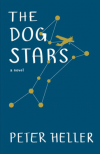 Libby Nominee #1:
Libby Nominee #1:
The Dog Stars by Peter Heller (Knopf)
I dare anyone to tell me they got through The Dog Stars without shedding a tear.While the post-apocalyptic world Peter Heller evokes has been wiped out due to disease and climate change, the very real human situations he portrays are the same as our own.
Besides, the man can write:
If I ever woke up crying in the middle of a dream, and I'm not saying I did, it's because the trout are gone every one. Brookies, rainbows, browns, cutthroats, cutbows, every one.
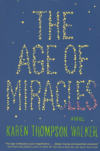 Libby Nominee #2:
Libby Nominee #2:
The Age of Miracles by Karen Thompson Walker (Random House)
I also love The Age of Miracles, a book narrated by an adult in the remarkably convincing voice of her thirteen-year-old self. That was her age when a planetwide catastrophe struck: For reasons that are never explained, the earth's rotation slowed down over the disorienting course of a slowing year.
If time simply ceases to correspond to the time we have always known, how do we connect with one another or rebuild society? More big questions—enough to establish plenty of literary cred—just as Karen Thompson Walker quietly captures that moment of awkward, but self-aware, adolescence:
We were used to my mother's rhetoric. She talked big. She blustered. She overstated and oversold. God-awful might have meant anything. It was a wide net of a phrase that scooped up a thousand possibilities, most of them benign: hot days and traffic jams, leaking pipes and long lines. Even cigarette smoke, if it wafted too close, could be really and truly God-awful.”
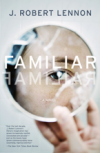 Libby Nominee #3:
Libby Nominee #3:
Familiar by J. Robert Lennon (Graywolf)
Then there's Familiar, a novel about a woman named Elisa trying to reconstruct her life when, in an instant, she’s transported into the body of a different version of herself and must resume that life.
This book truly unsettled me. In Elisa's "previous" life, her son is dead. In her new life, he’s alive. But which is the true life? Is the new situation with her son, in which she has been estranged from him, better than having him dead? Who are we? Are we defined by our relationships or by our solitary selves? Why wasn't Lennon on the NBA list?
Here’s just a taste of his sharp-eyed writing:
She believes that Silas’s death makes people feel superior to her. They decided at some point that it was probably her fault. In any event, her days of worrying about other people’s opinions of her are long over.
Everything’s going to change in a couple of minutes.
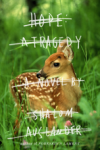 Libby Nominee #4:
Libby Nominee #4:
Hope: A Tragedy by Shalom Auslander (Riverhead)
Apparently, the NBA committee doesn't like comedy, either. One of the funniest, cleverest, and, ultimately, most moving novels I read this year was Shalom Auslander's Hope: A Tragedy. It’s about a young Jewish family who buys a house in upstate New York and discovers that the house has an addition in the attic.
In this alternate history, it turns out that Anne Frank—yes, that Anne Frank—has lived behind the attic door since the end of World War II. As the narrator of the story argues, in prose that made me laugh and then think, it’s not so good when an entire population allows their identity to be tied to a tragedy of immense proportions.
For instance, Auslander writes of Kugel, the man of the house, whose “dread of begging was due to neither a sense of pride nor a surfeit of courage”:
Kugel was determined not to die at the hands of another, if only to disprove his mother, who insisted that her last words, and her son's last words, and her son's son's last words, whatever they might be, would be said in a gas chamber.
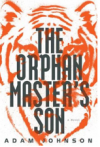 Libby Nominee #5:
Libby Nominee #5:
The Orphan Master’s Son by Adam Johnson (Random House)
While all the fiction titles I’ve mentioned so far may have been left off the NBA list because they were tossed into the genre box, there’s no excuse for ignoring a literary novel as magisterial as Adam Johnson's The Orphan Master's Son.
Johnson takes us inside a world that I guarantee no one reading this piece has seen: a North Korean reeducation camp. He also turns the horrific tale of his protagonist Jun Do into a story of hard-edged grace, right from the book’s opening:
Jun Do's mother was a singer. That was all Jun Do's father, the Orphan Master, would say about her. The Orphan Master kept a photograph of a woman in his small room at Long Tomorrows…. At night, he'd drink, and from the barracks, the orphans would hear him weeping and lamenting, striking half-heard bargains with the woman in the photograph. Only Jun Do was allowed to comfort him, to finally take the bottle from his hands.
I could go on and on with titles that moved and sparked me this year, that made me laugh and cry and shake—such as Victor LaValle's The Devil in Silver, a horror novel (of all things) about a monster that haunts a mental ward. I had to finish LaValle’s book before I went to sleep because his icy prose so unhinged me:
He smelled an unclean body. Something sour. Like the ammonia-haunted corner of a subway platform that has never been truly cleaned…. But then someone just leaned close to Pepper's ear and breathed into it.
The irony here is that Victor LaValle was an NBA judge in 2011, one who disagreed publicly with Laura Miller's assessment of that year's fiction picks as “the literary equivalent of spinach.” In LaValle's response in Publisher's Weekly, he noted:
I can only say that I served with four smart, passionate people who, above all else, love a good story. And while it was hard work to read through 315 books, from publishers large and small, the enthusiasm, the joy, we communicated to each other felt nothing like the kind of “good for you” motivation Miller ascribes to us. I got knocked on my ass with admiration for more than a dozen of this year’s books.
All right, maybe fiction readers should just agree to disagree. But at TW, we like talking things around, and we invite you to suggest other fiction titles you would have nominated for a National Book Award this year. And if your own wish list includes alternate nonfiction, poetry, and children’s lit books, pass those along, too. May the debate continue.
Don't miss Lorraine Berry's "Why Did a Manipulative Movie Make Me Cry?," her unusual take on this year's winner of the National Book Award for nonfiction: Behind the Beautiful Forevers by Katherine Boo.
Additional Publishing Information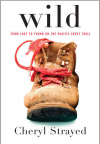
- "2012 National Book Awards Go to Erdrich, Boo, Perry, Alexander," Publisher's Weekly, November 14, 2012.
- “National Book Awards: Genre Fiction Dissed Again” by Laura Miller, Salon, October 10, 2012.
- Gone Girl by Gillian Flynn (Crown Publishers, 2012).
- The Devil in Silver by Victor LaValle (Spiegel & Grau, 2012).
- "How the National Book Awards Made Themselves Irrelevant" by Laura Miller, Salon, October 12, 2011.
- "An NBA Fiction Judge Responds to Laura Miller" by Victor LaValle, Publisher's Weekly, October 19, 2011.
- Wild: From Lost to Found on the Pacific Crest Trail by Cheryl Strayed (Knopf, 2012).
 Lorraine Berry is an associate editor at Talking Writing. She teaches creative nonfiction at a college in the Finger Lakes region of New York.
Lorraine Berry is an associate editor at Talking Writing. She teaches creative nonfiction at a college in the Finger Lakes region of New York.Lorraine has to nod to one 2012 nonfiction book that wasn’t nominated for a National Book Award: Cheryl Strayed's memoir Wild. It’s the biggest missing title in all four NBA categories this year.
In 1995, Strayed spent several months hiking the then newly opened Pacific Crest Trail on her own after the death of her mother. Wild is a tour de force, one that Oprah knighted as a book club pick. That’s the only reason Lorraine can see that this year’s NBA judges snubbed it.
However, she will be assigning one NBA winner and two nominees in her writing classes next spring. Lorraine's picks for her students: Behind the Beautiful Forevers, This is How You Lose Her, The Yellow Birds, and—yes—Wild.
